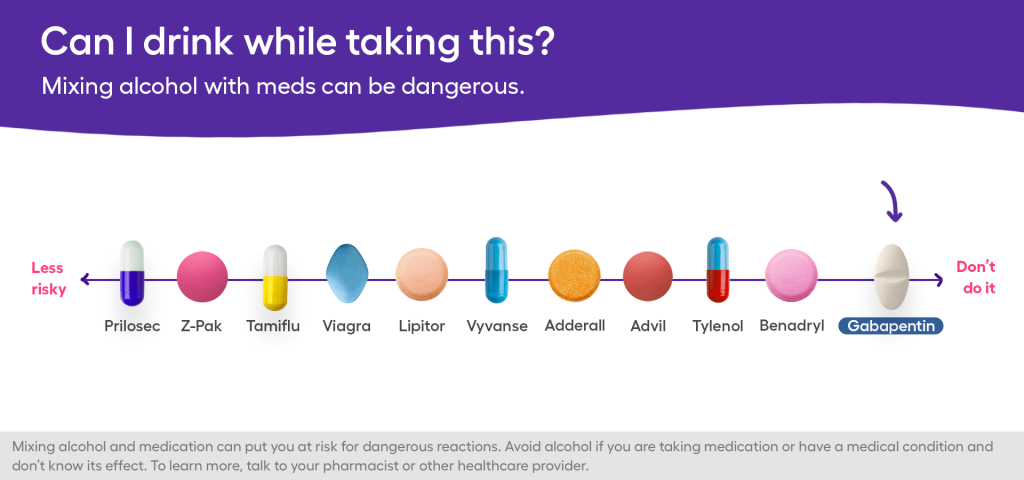Key takeaways
Mixing gabapentin and alcohol intensifies central nervous system depression, increasing risks of drowsiness, dizziness, and respiratory depression.
Consuming alcohol while on gabapentin can lead to severe side effects including increased risk of seizures, overdose, and death.
Gabapentin is used in treating alcohol withdrawal syndrome but should not be mixed with alcohol due to the risk of adverse effects.
No anticonvulsants, including gabapentin and others like Lyrica, should be taken with alcohol, as this combination can lead to dangerous side effects.
Gabapentin (brand name Neurontin) is a popular prescription drug used to treat nerve pain from shingles or seizures. So popular, in fact, that in 2004, gabapentin was prescribed more than 18 million times in the United States, and in 2017, that number jumped to over 46 million times.
Gabapentin is not currently classified as a controlled substance. However, the drug is involved in many substance abuse cases, alone or in combination with opioids. One popular question that many patients ask is if gabapentin and alcohol are compatible.
Can you drink alcohol while taking gabapentin?
Gabapentin and alcohol do not mix. You should avoid the combination of alcohol and gabapentin at all times. The manufacturer of Neurontin, Pfizer states, “Do not drink alcohol or take other medicines that make you sleepy or dizzy while taking Neurontin without first talking with your healthcare provider. Taking Neurontin with alcohol or drugs that cause sleepiness or dizziness may make your sleepiness or dizziness worse.”

What happens if you drink alcohol while on gabapentin?
Gabapentin and alcohol each individually cause central nervous system (CNS) depression and respiratory depression. Combining alcohol and gabapentin can worsen either or both effects.
CNS depressants slow brain activity and cause drowsiness and dizziness. Combining alcohol and gabapentin, two CNS depressants can worsen these effects, making you feel extra drowsy and dizzy, causing impairment and accidents. There is also an increased risk of seizures with excess alcohol use or alcohol withdrawal.
Respiratory depression occurs when you’re not getting enough oxygen. Your breathing can become slowed and shallow or even stop. In 2019, the FDA warned that gabapentin could increase respiratory depression risk when combined with risk factors such as:
- Older age
- Respiratory conditions such as COPD
- Use of medications (such as opioids) or substance use (such as alcohol) that depress the CNS
Alcohol consumption and gabapentin can intensify this effect and increase the risk of overdose and death.
Does gabapentin help with alcohol withdrawal syndrome?
Alcohol dependence is a common condition. Patients with alcohol use disorder are at risk of developing alcohol withdrawal syndrome if they abruptly stop drinking alcohol, which is why healthcare providers will prescribe a medication, like gabapentin or a benzodiazepine, and see the patient daily until alcohol withdrawal symptoms subside.
Symptoms of alcohol withdrawal syndrome include agitation, tremors, nausea, sweating, vomiting, hallucinations, insomnia, rapid heart rate, increased blood pressure, and seizures.
Depending on the severity, the patient may receive outpatient or inpatient treatment. Either way, the patient should receive ongoing treatment for alcohol dependence.
Are there any anticonvulsants (like gabapentin) that can be safely taken with alcohol?
So, if you’re taking gabapentin and looking to imbibe on the weekends, you may wonder if you can switch to another treatment option and safely drink. Unfortunately, the answer is no. The 2019 FDA warning about gabapentin also included Lyrica (pregabalin), another popular anticonvulsant. Other drugs used to control seizures also should not be mixed with alcohol, including:
- Tegretol (carbamazepine)
- Lamictal (lamotrigine)
- Topamax (topiramate)
- Trokendi XR (topiramate)
- Trileptal (oxcarbazepine)
- Keppra (levetiracetam)
- Depakote (divalproex sodium)
- Dilantin (phenytoin)
- Phenobarbital
- Benzodiazepines (such as Valium)
The same effects described above (CNS and respiratory depression) could potentially occur.
What are the side effects of gabapentin?
Even if you don’t drink alcohol, gabapentin can have adverse effects. You should consult your healthcare provider for medical advice about managing them. You could experience:
- Gastrointestinal (GI) effects: nausea, vomiting, constipation, diarrhea, dry mouth
- Nervous system effects: dizziness, sleepiness, fatigue, impaired coordination, tremor, involuntary eye movements
- Metabolic effects: swelling in the arms and legs, weight gain
Additionally, serious side effects associated with gabapentin include:
- Worsening depression
- Changes in mood or behavior
- Increased risk of suicidal thoughts or behavior
- Impaired driving
- Anaphylaxis
Gabapentin treatment should not be stopped abruptly because of the increased risk of seizures. Abrupt discontinuation of gabapentin can also cause anxiety, insomnia, nausea, pain, and sweating.
And remember, if you take gabapentin, avoid alcohol—entirely. The combination of alcohol and gabapentin is dangerous. If you have any questions, consult your healthcare provider or pharmacist for guidance.



